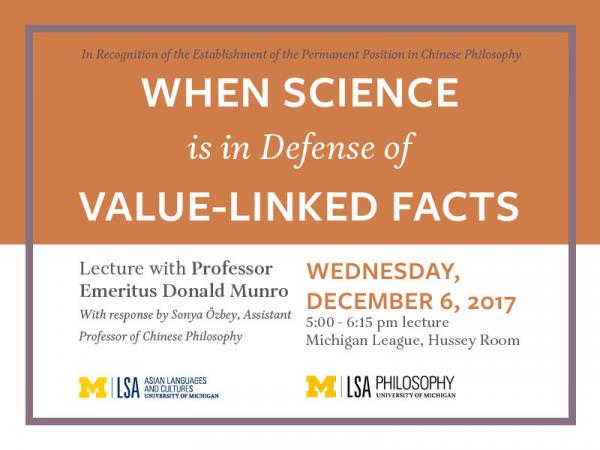When Science is in Defense of Value-Linked Facts
Professor Emeritus Donald Munro, University of Michigan
A fundamental and early difference between Western philosophy and Chinese Confucianism is the importance in the West of certain dichotomies and their absence in China. I refer to reason/emotions and mind/matter, which, as dichotomies, are absent in classical Chinese thought. The Chinese position is that we cannot talk about knowing apart from the emotions; they are mutually involved. The same is true of the subjective and objective. My comments argue that in modern Anglo American philosophy there has also been a division between natural facts and moral values. Violating this division (such as claiming that we can derive an “ought” from an “is”) is called the “naturalistic fallacy.” This division owes part of its origin to the old dichotomies between knowing and emotions, and between mind and matter. Drawing on Chinese ethics, and also considering Western positions, I argue that there is a necessary connection between moral values and a theory of human nature. There are also connections between certain values, emotions, and facts: (1) Health and well-being; contentment and suffering; clinical and subjective facts (2) Social bonding; love and sympathy; symbiotic care. (3) Harmonious [和谐的] adaptation to hierarchy; respect and shame; conformity and potential cooperation. My position ends by being in some ways consistent with those of the contemporary Western thinkers Daniel Dennett, Sam Harris, and Hillary Putnam.
The lecture will be followed by a response from Professor Sonya Özbey. If time permits, there will be a Q&A at the end.
The lecture will be followed by a response from Professor Sonya Özbey. If time permits, there will be a Q&A at the end.
| Building: | Michigan League |
|---|---|
| Event Type: | Lecture / Discussion |
| Tags: | Chinese Studies, Lecture, Philosophy |
| Source: | Happening @ Michigan from Asian Languages and Cultures |


